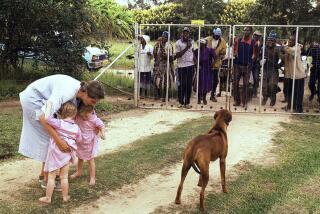Squatters Ignore Orders to Leave White-Owned Farms in Zimbabwe
- Share via
HARARE, Zimbabwe — Former guerrillas on Friday mostly ignored orders to leave white-owned farms they have invaded after the president said the government would not intervene to drive them out.
President Robert Mugabe contradicted his police minister by saying the government would not move against the squatters, who he said were engaged in “peaceful and lawful demonstrations” in support of demands for white-owned land.
Over the past week, ex-guerrillas and their families, tired of waiting for the government to buy white-owned land and distribute it to poor black farmers, have taken over about 70 homesteads.
Farmers’ leaders said the invasions increased Friday with at least five more properties invaded by squatters armed with spears, axes, clubs, knives and some guns. The former guerrillas fought in the war against white rule that led to independence in 1980.
On Thursday afternoon, Home Affairs Minister Dumiso Dabengwa said squatters would be forcibly removed if they didn’t leave by early today.
But in the evening, state television broadcast an interview with Mugabe in which he said the government would not intervene. The interview had been taped in the morning.
The Commercial Farmers’ Union, representing about 4,000 white farmers, said union members reported that police in their districts had no official confirmation of their orders to disperse squatters and would not act without it.
The National Constitutional Assembly, a coalition of opposition, human rights and civic groups, described the invasions as a ploy by Mugabe’s ruling party to shore up its flagging support ahead of elections in April.
The government met defeat in a February referendum that rejected its proposed changes to the constitution to allow the government to seize white-owned farms.
On Thursday, the government said it would change the constitution anyway, arguing that white farmers forced or paid their workers to oppose the proposals in the referendum.
The vote was Mugabe’s biggest electoral defeat since the former British colony of Rhodesia became independent Zimbabwe in 1980.
Since 1980, a land reform program has fallen far short of its targets and has been plagued by mismanagement and corruption, with prime properties bought by the state going to politicians and their cronies.
The worst economic crisis since independence has posed the biggest threat to Mugabe’s hold on power.
To shore up his waning support, Mugabe repeatedly has promised to hand out free land seized from the descendants of the British settlers.
More to Read
Sign up for Essential California
The most important California stories and recommendations in your inbox every morning.
You may occasionally receive promotional content from the Los Angeles Times.













